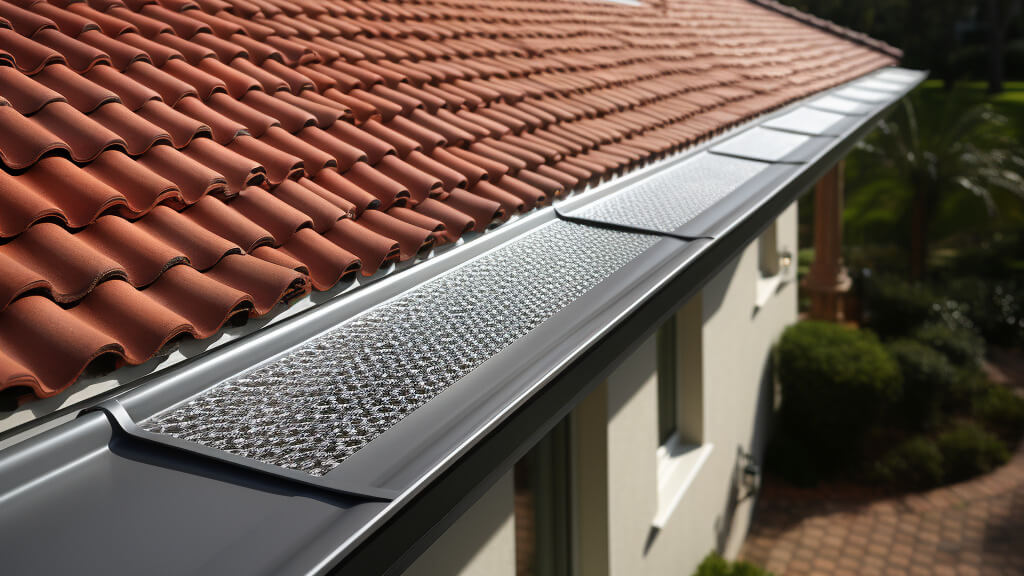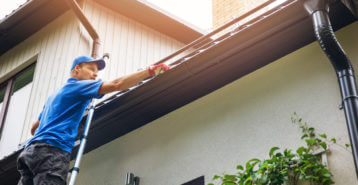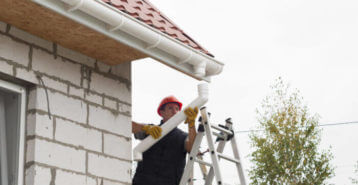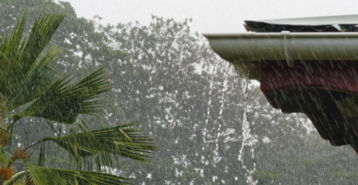What Are the Most Common Types of Gutter Guards?
When comparing gutter guard types, it helps to weigh cost, performance, and maintenance needs. Below are five common gutter guard options, including typical cost ranges and the pros and cons of each.
1. Screen Gutter Guards
- Cost: $1.50 to $6.00 per linear foot
- DIY-Friendly: Yes
- Best for: Basic leaf and debris protection
Screen guards are one of the most affordable and widely used gutter guard types. They’re made from aluminum, plastic, or wire mesh and sit over the top of your gutter to block larger debris like leaves and twigs.
They’re easy to install yourself and work well in areas with moderate leaf fall. However, smaller debris can sometimes pass through, so periodic cleaning may still be needed to prevent clogs. Metal screens are more durable and should be inspected and cleaned at least twice a year for best performance.
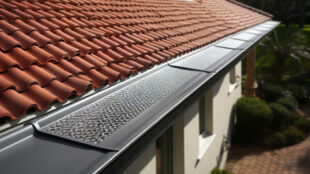
2. Mesh Gutter Guards
- Cost: $1.50 to $10.00 per linear foot
- DIY-Friendly: Not typically
- Best for: Smaller debris and finer filtration
Mesh guards function like screens but with finer holes for better filtration. Micro-mesh versions can block pine needles, seeds, and other tiny particles that standard screens may let through. They offer excellent protection but typically require professional installation.
These guards are a strong long-term solution for homes surrounded by trees that drop fine debris. In very heavy rain, some micro-mesh designs can be overwhelmed and cause water to overshoot the gutter, so choose a design that balances debris protection with water flow.
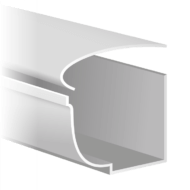
3. Reverse Curve (Surface Tension) Gutter Guards
- Cost: $3.00 to $25.00 per linear foot
- DIY-Friendly: No
- Best for: Long-term protection and curb appeal
Reverse curve gutter guards — also called surface tension gutter guards — guide water over a curved surface into the gutter while debris slides off the edge. They’re designed for durability and are often color-matched to blend in with your roofline.
They’re popular for their sleek appearance and effectiveness at blocking large debris. Because they’re visible from the ground, not everyone prefers the look. These guards usually require professional installation, and in some cases, lifting shingles during installation could affect a roof warranty.
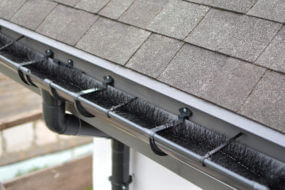
4. Bottle Brush Gutter Guards
- Cost: $3.00 to $4.25 per linear foot
- DIY-Friendly: Yes
- Best for: Quick, temporary protection
Bottle brush guards are made of bristle-like materials that sit inside the gutter. Water flows through while the bristles trap leaves and other debris on top. They’re simple to install and easy to remove for cleaning.
These are ideal if you want a low-cost, low-commitment option. However, small debris can get caught in the bristles, which means you’ll likely need to remove and shake them out regularly. They work best in areas with light to moderate foliage and can be a good seasonal solution.
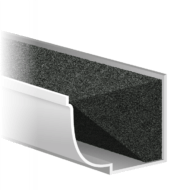
5. Foam or Sponge Gutter Guards
- Cost: $2.00 to $3.25 per linear foot
- DIY-Friendly: Yes
- Best for: Short-term or emergency use
Foam gutter guards are inserted directly into the gutter channel. Their porous material lets water through while helping keep debris out. They’re budget-friendly and available at many home improvement stores.
While helpful in a pinch, especially before storms, they’re not a long-term fix. Foam can deteriorate over time, become clogged, or freeze in cold weather and restrict water flow. They can also collect mold or mildew, so plan to replace or clean them more often than other types.
How Much Do Gutter Guards Cost?
On average, gutter guard installation costs range from $3 to $25 per linear foot, or $800 to $5,000 total, depending on the type of guard and installation complexity. Higher-end systems typically cost more, but they can offer better durability, longer lifespans, and professional installation.
| Gutter Guard Type | Average Cost per Linear Foot |
|---|---|
| Screen Mesh | $1.50 - $6.00 |
| Solid Surface | $5.00 - $10.00 |
| Micro-Mesh | $8.00 - $25.00 |
| Foam Inserts | $2.00 - $3.00 |
| Bottle Brush | $3.00 - $5.00 |
Looking for costs by brand?
Here’s what you can expect to pay for two of the most well-known gutter guard brands:
- LeafFilter: $10 to $30 per linear foot, or about $3,000 to $8,000 for a full installation
- LeafGuard: $15 to $45 per linear foot, or roughly $3,000 to $9,000 total
These price ranges usually include professional installation and can vary based on your home’s size, gutter condition, and job complexity. Always compare multiple quotes to get the best value.
» Need a breakdown of costs by material, square footage, or gutter guard type? Check out our full gutter guard cost guide to compare options and narrow down what fits your budget. Or tap the banner below to see personalized gutter system costs.
How Do Gutter Guards Work?
Gutter guards help protect your home and cut down on seasonal gutter cleaning. Installed over or inside your gutters (depending on the type), they act as a barrier that lets water in while keeping leaves, twigs, and other debris out.
In simple terms: water passes through or into the guard and into the gutter, while debris is blocked on top.
Here’s how they work:
- Water flows through the gutter guard and into your gutter system.
- Leaves, pine needles, and other debris are blocked before they can clog your gutters.
- Depending on the gutter guard type, debris may blow away naturally or need to be cleared from the top occasionally.
Without gutter guards, gutters can clog quickly — especially in the fall or after storms. That can lead to overflow, water damage, and even foundation issues. While no system is 100% maintenance-free, most gutter guards reduce clogs, extend gutter lifespan, and lower the time you spend on upkeep.
Pros of Gutter Guards
- Protect Your Home From Costly Damage: Gutter guards help prevent clogs caused by leaves, twigs, and ice. This reduces the risk of water overflow, foundation issues, and structural damage, especially during heavy rain or winter storms.
- Keep Pests Out of Your Gutters: Covered systems make it harder for birds, rodents, and insects to nest or breed. By limiting access to standing water and shelter, gutter guards can help prevent infestations.
- Reduce Fire Risks in Dry Climates: In wildfire-prone areas, windblown embers can ignite dry debris sitting in gutters. Gutter guards help keep this material out, lowering the risk of fire hazards.
- Cut Down on Gutter Cleaning: With less debris to deal with, your gutters require less maintenance throughout the year. Guards can also reduce rust, corrosion, and wear that lead to early replacements.
- Minimize Mold and Mildew Buildup: Blocking moisture-holding debris helps reduce mold growth inside your gutters and roofline. Cleaner gutters can also help protect your foundation from moisture-related damage.
Cons of Gutter Guards
- They Come With an Upfront Cost: Gutter guard installation can range from $460 to $4,000, depending on the type, material, and whether you hire a pro. DIY-friendly options like foam or brush guards are cheaper but often less effective.
- Some Debris Can Still Get Through: Tiny materials like pine needles or seeds may slip through certain gutter guard types. While guards reduce cleaning, occasional maintenance is still needed to clear buildup and prevent moss or algae growth.
- They Can Add Weight to Your Gutter System: Some guard systems can weigh down gutters, especially if not cleaned regularly. This can cause sagging or added stress on your roof. A professional can help confirm compatibility with your existing gutters and structure.
Finding an Experienced Gutter Professional
Ready to install gutter guards? The right pro can make all the difference. An experienced gutter installer will evaluate your home, recommend the best gutter guard type for your needs and climate, and ensure everything is installed properly.
Think about your long-term goals: are you looking for a quick, budget-friendly DIY fix or a durable, low-maintenance solution that lasts for years? Either way, a licensed contractor can help you make a smarter investment.
Modernize makes it easy to find trusted, local gutter professionals. We’ll connect you with vetted pros who can guide you through the selection process and handle your installation with confidence.
Compare top-rated gutters pros in your area.
Read real homeowner reviews, explore qualifications, and view promotions. Modernize makes it easy to browse professionals and find one that will be perfect for your project.
